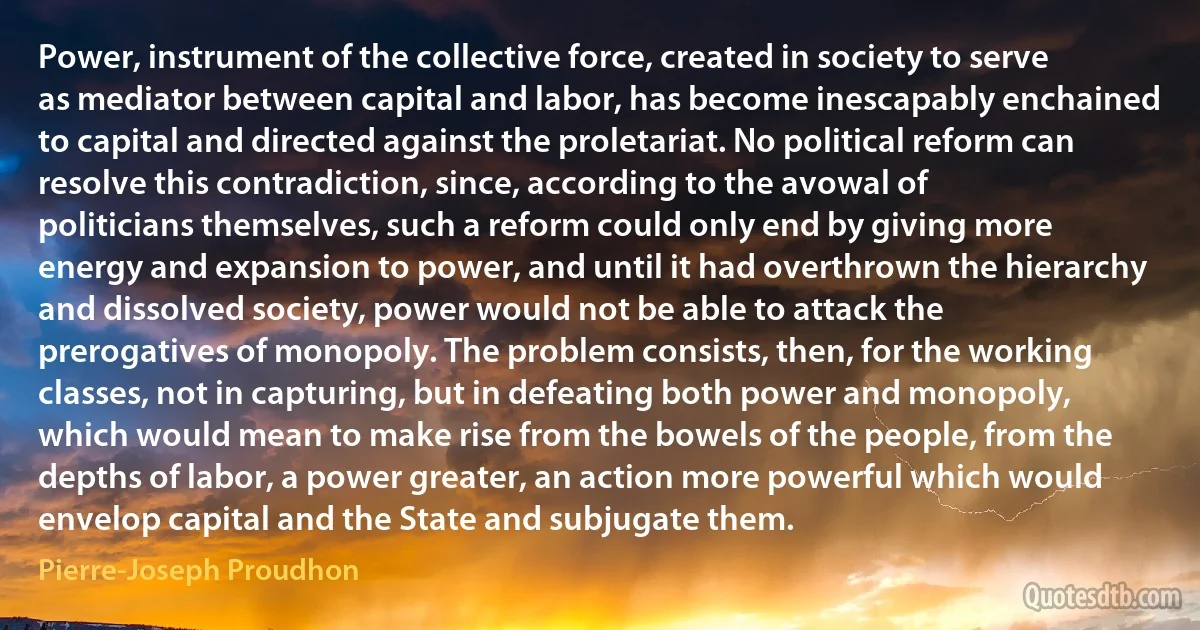
Power, instrument of the collective force, created in society to serve as mediator between capital and labor, has become inescapably enchained to capital and directed against the proletariat. No political reform can resolve this contradiction, since, according to the avowal of politicians themselves, such a reform could only end by giving more energy and expansion to power, and until it had overthrown the hierarchy and dissolved society, power would not be able to attack the prerogatives of monopoly. The problem consists, then, for the working classes, not in capturing, but in defeating both power and monopoly, which would mean to make rise from the bowels of the people, from the depths of labor, a power greater, an action more powerful which would envelop capital and the State and subjugate them.
Pierre-Joseph ProudhonRelated topics
able action attack avowal contradiction end envelop expansion force giving hierarchy labor mean monopoly people power problem proletariat rise serve state workingRelated quotes
Let us imagine that the aboriginal-original human specimen was one of two brother apes, A and B; they were alike in every respect; both were animal space-binders; but something strange happened to B; he became the first time-binder, a human. ... He had thus a new faculty, he belonged to a new dimension; but, of course, he did not realize it; and because he had this new capacity he was able to analyze his brother "A"; he observed "A is my brother; he is an animal; but he is my brother; therefore, I AM AN ANIMAL." This fatal first conclusion, reached by false analogy, by neglecting a fact, has been the chief source of human woe for half a million years and it still survives. ... He [then] said to himself, "If I am an animal there is also in me something higher, a spark of some thing supernatural."

Alfred Korzybski
In fact, there is something puzzling about the Higgs mass we now do observe. It is generally known as the "hierarchy problem.” Since it is the Higgs mass that sets the scale for the masses of all other known elementary particles, one might guess that it should be similar to another mass that plays a fundamental role in physics, the so-called Planck mass, which is the fundamental unit of mass in the theory of gravitation. (It is the mass of hypothetical particles whose gravitational attraction for one another would be as strong as the electric force between two electrons separated by the same distance.) But the Planck mass is about a hundred thousand trillion times larger than the Higgs mass. So, although the Higgs particle is so heavy that a giant particle collider was needed to create it, we still have to ask, why is the Higgs mass so small?

Steven Weinberg
June 7, 1776, Richard Henry Lee, on behalf of the Virginia delegation, submitted to the Continental Congress three resolutions, of which the first declared that "these United Colonies are, and of right ought to be, free and independent States, that they are absolved from all allegiance to the British Crown, and that all political connection between them and the State of Great Britain is, and ought to be, totally dissolved. This resolution, which may conveniently be called the Resolution of Independence, was finally voted by the Continental Congress on the 2 of July, 1776. Strictly speaking, this was the official declaration of independence; and if we were a nation of antiquaries we should no doubt find an incongruity in celebrating the anniversary of our independence on the 4 of July.

Carl L. Becker
I've found just the right partner to help me shake up Washington, Gov. Sarah Palin of the great state of Alaska. ... She has an executive experience and a real record of accomplishment. She's tackled tough problems, like energy independence and corruption. She's balanced a budget, cut taxes, and she's taken on the special interests. She's reached across the aisle and asked Republicans, Democrats, and independents to serve in her administration. She's the wonderful mother of five children. She's -- she's helped run a small business. She's worked with her hands and knows -- and knows what it's like to worry about mortgage payments, and health care, and the cost of gasoline and groceries. She knows where she comes from, and she knows who she works for. She stands up for what's right, and she doesn't let anyone tell her to sit down.

John McCain
We never fully understood why Milosevic decided to give Sarajevo to the Muslims. But in retrospect, the best explanation may be that he was fed up with the Bosnian Serbs and had decided to weaken their Pale base by giving away the Serb-controlled part of Sarajevo. By giving the Federation all of Bosnia's capital, perhaps Milosevic wanted to weaken Karadzic and stregthen the Serbs in other parts of Bosnia, especially Banja Luka. This explanation was consistent with one of Milosevic's main themes at Dayton: that the Bosnian Serb leadership had become an impediment, even though he had earlier made common cause with them. Milosevic had often talked of strengthening the "intellectuals" and businessmen of Banja Luka in order to weaken Pale; now he seemed to be putting his theory into action.

Richard Holbrooke
